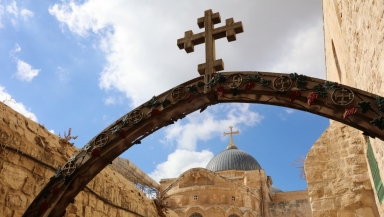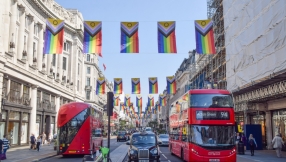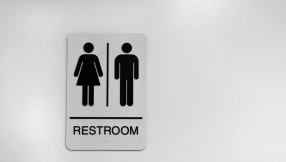
The uptick in anti-Christian acts in Israel that began last December continued last week when police arrested five suspects accused of harassing Christians in Jerusalem's Old City.
Four adults and one minor were arrested Wednesday (Oct. 4), charged with assault for allegedly spitting at Christians and their sacred sites in Jerusalem, according to police and Israeli media sources.
The incidents took place during Sukkot, the week-long Jewish "Feast of Booths (or Tabernacles)," with the alleged harassment taking place against Christians celebrating the holiday. Several thousand Christian tourists were in the city to celebrate their version of the Feast of Tabernacles.
The first known incident occurred on Monday (Oct. 2) when a group of foreign pilgrims exited a church building with a large, red, wooden cross to begin a procession through the Old City, as passing Orthodox Jews spat on them or at their feet, according to local media reports.
In a video of the interaction that surfaced online shortly after the incident, at least seven Orthodox Jews in dark suits, along with small children, can be seen spitting on the ground beside the group of Christians.
Jerusalem District Police Commander Doron Turgeman said in a press statement that continued harassment of Christians in the Old City was a "shameful and ugly phenomenon." He said officers in the Old City have redoubled their focus on stopping such attacks.
"We will not tolerate expressions of hatred towards anyone, whether Jews, Muslims or Christians, in the Old City and anywhere else in Jerusalem," Turgeman said. "Violence and hatred, however they manifest, are unacceptable."
But Elisha Yered, an ultranationalist leader in Israel's settler movement, defended the accused. He wrote on X (formerly Twitter) that spitting at Christian clergy members and at churches was an "ancient Jewish custom."
Yered made the statement while under house arrest for his alleged involvement in the politically motivated killing of a 19-year-old Palestinian man.
Itamar Ben Gvir, Israel's Minister of National Security, said on Army Radio that spitting at Christians was "not a criminal case." Like Yered, Ben Gvir had previously defended the act of spitting on Christians as a Jewish custom.
At the same time, the incident and subsequent video were met with widespread condemnation from religious and government leaders across Israel, including both the Chief Ashkenazi and Sephardic rabbis of Israel and the rabbi of the Western Wall and Holy Sites in Jerusalem.
Israel's Sephardic Chief Rabbi Yitzhak Yosef said in a statement that the attacks must be condemned, adding, "This is nationalism that has no place and has nothing to do with Judaism."
The alliances that Prime Minister Benjamin Netanyahu has formed with ultra-Orthodox political parties is said to have contributed to such harassment, but he spoke out against anti-Christian acts such as the incidents during the Feast of Tabernacles.
"Israel is fully committed to safeguarding the sacred right of freedom of worship and pilgrimage to the holy sites of all faiths," Netanyahu said in a statement. "Offensive behavior toward worshippers is a desecration and is unacceptable. We will show zero tolerance toward any harm to worshippers."
The tension during Sukkot wasn't limited to spitting. A group of around 50 ultra-Orthodox Jews protested against the Christians' celebration of the Feast of Tabernacles in Jerusalem on Tuesday night (Oct. 3). The protestors, mostly adolescent boys and children, were cordoned off behind police barricades on a street corner opposite Jerusalem's Pais Arena, where the event was held.
The Christians' celebration of the Feast of Tabernacles is one of the largest annual celebrations by evangelicals in Israel. Organized by a Christian Zionist organization known as the International Christian Embassy Jerusalem (ICEJ), it brings thousands of Christians from around the world to Israel for an eight-day celebration during Sukkot.
Mina Fanton, a former Jerusalem city council member, called for the demonstration, warning against "missionary traps" that she said would be set at the ICEJ event.
Protestors chanted "missionaries go home" and held up signs that read, "No to a Jewish holocaust." They accused the ICEJ of declaring a "spiritual war against Jews."
Emboldened Fringe Groups
Sporadic attacks of Christians living and worshiping in Jerusalem have happened on and off for years, but until late 2022, they usually were seen only as a nuisance.
That changed in December 2022, when Netanyahu was forced to establish alliances with extremists and ultra-Orthodox political parties in order to form a voting bloc in the Knesset.
Almost overnight, members of Israeli fringe groups appeared to be emboldened and empowered by a newfound sense of impunity. Groups of extremist ultra-Orthodox Jews and "anti-missionary" militants dramatically stepped up their attacks against Christians in Israel, according to Christian leaders in Jerusalem.
There is some type of harassment almost every week now. It is commonplace for settlers or Haredim to intimidate Christians by threatening them with pepper spray. Christian symbols and cemeteries are vandalized. Yeshiva (Orthodox seminary) students routinely spit and yell threats, insults and profanity at priests, nuns and pilgrims. Worship services and religious processions in the Old City are disrupted by demonstrators bearing lists of grievances and often blunt weapons.
Police have been criticized for reportedly not taking the attacks seriously and refusing to treat the incidents as part of a trend. Response times of police in the Old City, a place where the security presence is ubiquitous, for unknown reasons can be dismal.
After an attack at the Tomb of the Virgin Mary in March, it took more than half an hour for police to arrive at the scene from a security outpost only six minutes away by foot. The rapid arrest of suspects during Sukkot and police statements emphatically supporting the religious freedom of Christians in the Old City may be a sign that Jerusalem police have been receptive to the criticism leveled against them.













